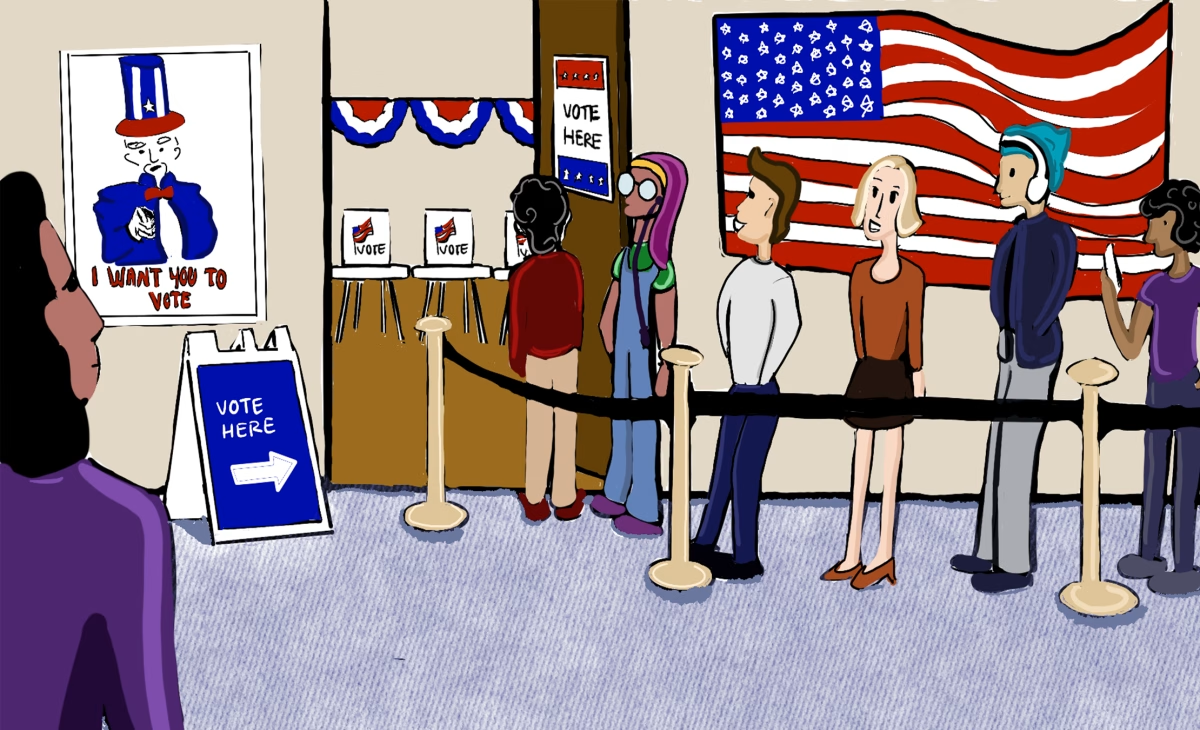As eligible and registered voters fill out their early ballots and gear up to hit the voting booths on election day, international students watch from the sidelines, hoping that their political views will be represented in this election.
In the 2023-2024 academic year, over 800 international students enrolled at DePaul University. They make up about 6% of the total undergraduate freshmen and 40% of total masters students enrolled at the university.
In this election cycle, policies on immigration, economy and reproductive rights will affect people of all citizenship statuses.
Since international students are temporary residents and do not have citizenship status in the United States, they are not considered eligible voters.
Shikha Patel, a second year Master of Fine Arts student entered the country with a green card during the Trump administration.
Before she arrived in the United States, she had heard good things about the medical care, education and how the country was free. However, she felt a lot of culture shock when she arrived.
“It was a lot of surprises, I would say. In regards to politics, I would say it was very different because I expected Chicago to be very liberated,” Patel said.
A few months ago, when Biden and Trump were running, she said that things were “not looking that great,” and even though Kamala Harris is now the presidential candidate, she still would not vote for the Democratic or the Republican candidate, if she could.
“I have to see where I land in this world,” Patel said. “Because of the way things are going, I don’t see myself still being in this country.”
Joe Tafoya, an assistant professor in the political science department, shared that the political climate outside of the university affects the way students perceive the university and the city.
“We are concerned about political rhetoric making its way into the campus community, how that could influence the overall environment in our campus and in campuses across Chicago and across the country, impacting how international students may feel welcomed and supported,” Tafoya said.
Additionally, Tafoya said that a new administration affects the way immigration policies are enforced, impacting international students.
“It is going to specifically affect visa policies, the visas that international students need to get access to to come to the United States to be students,” he said.
When Patel arrived in the United States, she was subject to an extremely thorough immigration process which was not the same for someone she saw coming from Russia or Ukraine, she said.
“We had two police verifications. We had to go through another police verification when we came to the country and we had to do an interview again … just so that we could prove everything,” she said.
Even though Patel has a green card, she is not able to vote or access Medicare or Medicaid.
She is concerned about how the administration will use her tax money to improve housing conditions and curb homelessness.
“We all pay taxes, but we all don’t get the same benefits. So I’m hoping our taxation is used for something, for the benefits of its own citizens,” she said.
Patel is also concerned about reproductive rights along with a second year graduate student in the animation program at DePaul, who was granted anonymity due to fear for her visa status.
“I am someone who suffers from a lot of reproductive health issues, so it matters to me that that’s taken care of,” the animation student said.
She is also concerned about the economy, along with 81% of registered voters, according to Pew Research Center.
“I want to be able to live with the salary I have,” she said. “The salary I have also pays my loans. So it is important to me that things are reasonably priced, and it just doesn’t keep hijacking.”
Additionally, she wants the people living here to be treated well and politicians to prioritize their citizens.
“The politics here affects people who live here more than it affects me, and the way it affects them is how those people treat us,” she said.
In a similar vein, Tafoya said that changes in economic conditions affect the way immigrants are perceived by people in the country.
“We know that during tough economic times, the American public does develop anti-immigrant sentiment,” he said. “This anti-immigrant sentiment is largely devoted to anyone who is different, regardless of legal status.”
Tafoya said that international students add diversity to the city and the campus, but they also contribute to the local economies in multiple ways.
“International students bolster local economies through tuition, through housing, through spending, making their voices important in the political process,” he said.
Even if these students cannot contribute directly to the political process by voting, Tafoya suggests that they contribute by asking other people to vote.
“I’ve heard a number of my friends say ‘If I can’t vote, I can ask five people to vote and all of a sudden I can be the person that helps them turn out to vote when they would not normally have thought about voting,’” he said.
The second-year animation student urges the same. She asks people who can vote to go out and cast their ballots.
“Go ahead and vote and show … you have an opinion. This is the only place where people have power,” she said.
Related Stories:
- International students need on-campus jobs the most
- Vaccine requirement more complicated for international students
Support Student Journalism!
The DePaulia is DePaul University’s award-winning, editorially independent student newspaper. Since 1923, student journalists have produced high-quality, on-the-ground reporting that informs our campus and city.
We rely on reader support to keep doing what we do. Donations are tax deductible through DePaul's giving page.

